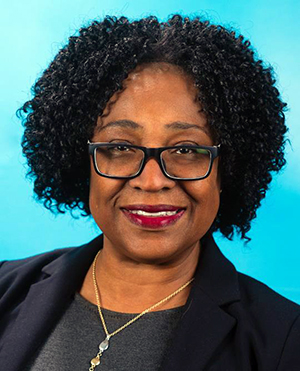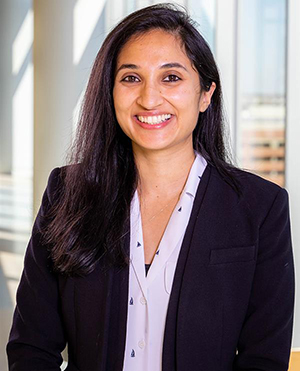
Suchitra Rao, MD

Ihuoma Eneli, MD

Simran Randhawa, MBBS

Chris McKinney, MD
IN THE NEWS
Reporters locally and nationally turn to the School of Medicine for expertise and research news. Here are some examples from near and far.
April 2024
James Burton, MD, professor of medicine, described the change in the patients who need liver transplants since the pandemic. He told the Denver Post in January that a typical patient with liver failure from alcohol use is an older man with a long history of heavy drinking, but in recent years, more women and people under 40 need transplants. He said the trend has been occurring for a decade but was fueled after COVID-19 in 2020. “The pandemic poured gasoline on a fire,” he said.
Jarratt Pytell, MD, MHS, assistant professor of medicine, discussed his research on alcohol consumption during the pandemic with the Denver Post in January. His study found increases in the sale of high potency alcohol in 2020, noting that increased consumption could lead to higher alcohol-related health care and societal burden.
Joseph Schacht, PhD, associate professor of psychiatry, told the Denver Post in January that alcohol is a problem if a person has injured themselves or someone else while drinking, or if family or friends have expressed concern about the person’s alcohol use. “If you are questioning how much you’re drinking, you probably should cut back,” he said.
Emmy Betz, MD, MPH, professor of emergency medicine, was quoted by the Washington Post about older adults signing advanced directives agreeing to restrict their driving in cases of cognitive impairment. “This is a big challenge when it comes to driving, because people don’t react appropriately and self-regulate,” she said in January.
Sarah Jolley, MD, associate professor of medicine, offered perspective in a January report by Scripps News on cases of long COVID. “We still have between 50 and 100 referrals coming in a week,” she said. “But with that number of patients coming in, we have more referrals than doctors that can see them. So we certainly need more clinical resources put towards caring for patients with long COVID.”
Suchitra Rao, MD, associate professor of pediatrics, discussed with The New York Times a large analysis of long COVID in children that was published in February by the journal Pediatrics. The review suggested that 10% to 20% of children in the United States who had COVID developed long COVID. However, Rao, who was a co-author on the paper, acknowledged that there are “lots of caveats” with the prevalence estimates used to arrive at that number.
Richard Zane, MD, chair of emergency medicine and UCHealth chief innovation officer, in February discussed with the Denver Gazette the impact on the hospital system of providing care for migrants arriving in Denver: “We always put patients first, and we are proud to provide care to everyone who comes to our emergency departments regardless of their insurance or immigration status; however, the demands on our hospitals and providers as well as the amount of uncompensated care we are providing is now unsustainable.”
Kia Washington, MD, professor of surgery, discussed her work on whole eye transplants, which has been funded by the U.S. Department of Defense Joint Warfighter Medical Research Program, with CBS Colorado in a January report.
Ihuoma Eneli, MD, professor of pediatrics, was quoted in a December New York Times article about teenagers and obesity. She explained the problem she and other pediatricians struggle with: “How do we reconcile the message when we tell a child that weight doesn’t define them, that it’s just a number,” and then, in the next breath, suggest that the child take a weight loss medication?
Matthew DeCamp, MD, PhD, associate professor of medicine and member of the Center for Bioethics and Humanities, was quoted in February in a National Public Radio report about a debate about the definition of brain death. “The American Academy of Neurology proposes putting into law only three specific criteria for the determination of death by neurologic criteria. ACP [American College of Physicians] opposes putting only three criteria into law because doing so would be overly narrow and privileges certain brain functions over others,” he said. “The wholebrain standard is a firmer biologic foundation for determining death.”
Eric Campbell, PhD, professor of medicine and director of research at the Center for Bioethics and Humanities, was quoted in a Washington Post article in January about his study finding that only 57% of physicians welcomed disabled patients. “It’s shocking that so many physicians say they don’t want to care for these patients,” he said.
Simran Randhawa, MBBS, assistant professor of surgery, was interviewed in January on the NBC affiliate in Denver about lung cancer cases among women. “Lung cancer in never-smokers is on the rise now,” she said. “In fact, about 15 to 20% of patients that I see in clinic with lung cancer have never smoked a single cigarette in their entire lives.”
Amy Feldman, MD, MSCS, associate professor of pediatrics, for a report in January about liver donation on the ABC affiliate in Denver, explained: “The liver is really special because it can regenerate. So, you can take a piece of liver out of a grown-up person like you and put it into a child, it will immediately start working in the child and within a couple of weeks it will be regrown back to a full size in both the donor and the recipient.”
Emmy Betz, MD, MPH, professor of emergency medicine and director of the Firearm Injury Prevention Initiative, was quoted by the Wall Street Journal in a December article about how gun shops can help prevent suicide: “It’s not about politics, it’s not an angry argument over gun law, it’s about how we can work together on an option that is voluntary, but might help people in crisis. It feels like a very practical solution.”
Chris McKinney, MD, assistant professor of pediatrics, described caring for patients with sickle cell disease after the U.S. Food and Drug Administration in December approved two new gene therapies that can cure the disease. “This is an exciting time for sickle cell … and this has radically changed our conversations that we have with patients,” he told Colorado Public Radio in January.
Yoni K. Ashar, PhD, assistant professor of medicine, described pain reprocessing therapy for chronic pain patients in a December article in the Wall Street Journal. Patients’ pain is often resolved within eight to 10 sessions, he said. “One of the really intriguing ideas that comes out of this is reconceptualizing chronic pain as more of a psychiatric or mental health condition,” he said.
Jay Lemery, MD, professor of emergency medicine and director of the Climate and Health Program, was quoted by CNN in December in a report about the climate medicine program he helped create. “This is our first foray into training a climate-savvy health care workforce,” he said. “We need credible, knowledgeable, and effective leaders, and we want to send a message to clinicians that these are critically important skills for mitigating climate-driven health effects.”
Eric McCarty, MD, professor of orthopedics, commented in the Washington Post in December on reports that New York Jets quarterback Aaron Rodgers was considering a return to play after suffering a torn Achilles’ tendon in the first game of the season. “When you first hear that, and you don’t look at every part of it and dive into details, from afar you’re thinking, ‘That’s very fast and too soon,’” he said. “However, as we as sports medicine physicians look into it and see what has occurred and everything he has available to himself, we start thinking, ‘All right ... it’s in the realm of possibility.’ As sports medicine surgeons and sports medicine physicians, we are always pushing the envelope on trying to get our athletes back out on the playing field.”
Daniel Bessesen, MD, professor of medicine and director of the Anschutz Health and Wellness Center, discussed the impact of obesity-treatment drugs with the Associated Press in November. “It’s something that really changes a lot of things in their life,” he said. “They go from food being a central focus to it’s just not.”
Laura Campos, AuD, clinical instructor of otolaryngology – head and neck surgery, was quoted by National Public Radio in November in a report about her study on how hearing loss can lead to deadly falls, but hearing aids may help reduce the risk. “We found, quite significantly, that individuals that wore hearing aids compared to those that didn’t, did show a significantly lower prevalence,” she said. “They reported fewer falls.”
Alyssa Olenick, PhD, an exercise physiologist and postdoctoral fellow in the energy metabolism lab in the Department of Medicine, was quoted in a November article in The New York Times about the health benefits of walking. Once your body becomes accustomed to walking, you might want to pick up the pace, she said, noting that studies suggest that moderate physical activity strengthens your heart and creates new mitochondria, which produce fuel for your muscles.